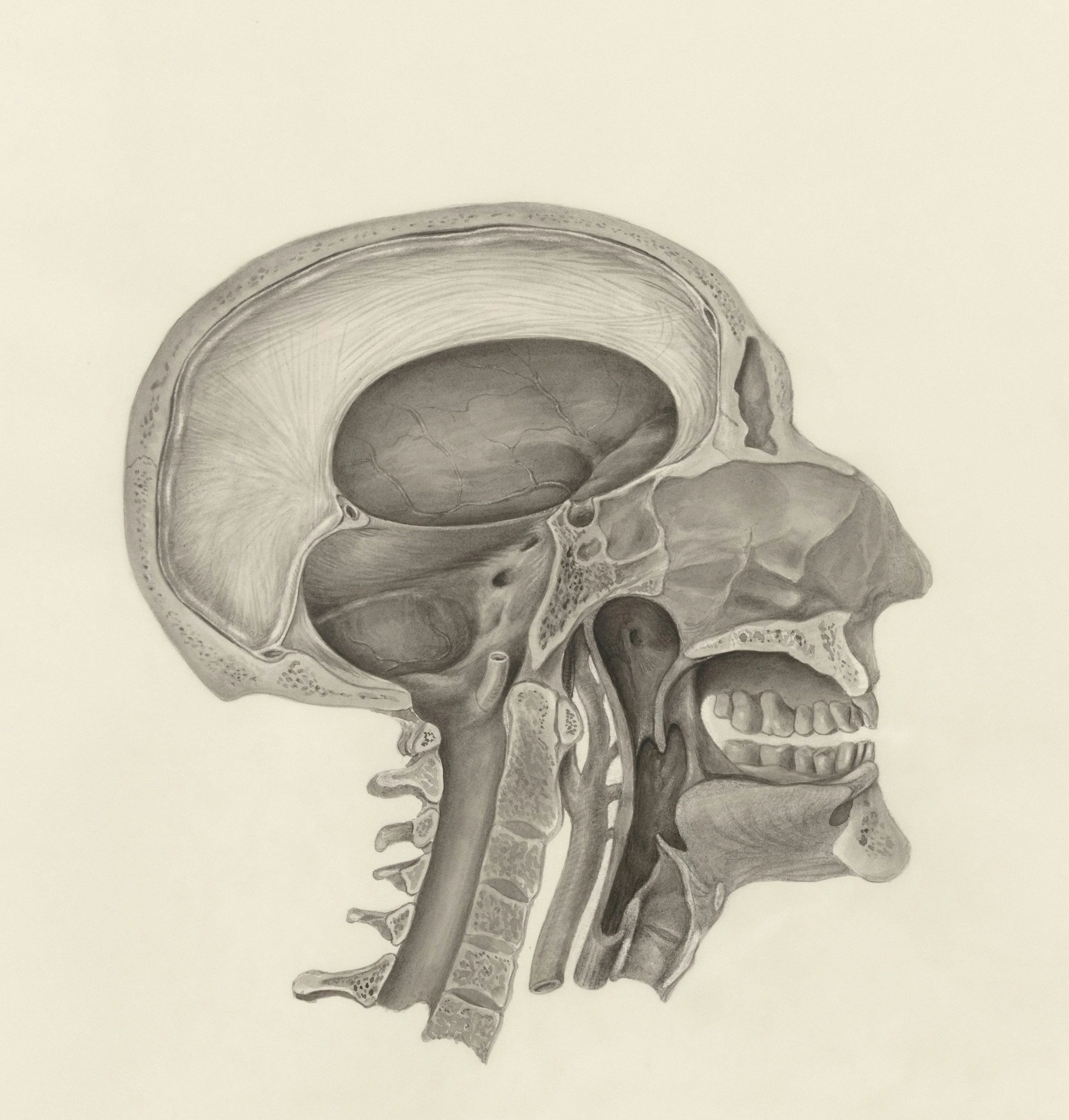Integrative Massage Therapy for TMJ Disorders.
As an RMT and Certified TMJ Intra-oral Therapist I offer specialized massage therapy from a compassionate and holistic approach for TMJ dysfunction, neck pain, headaches, and migraines. Using advanced techniques and—including intraoral treatment— I target deep muscle tension to improve jaw mobility and relieve chronic discomfort. Each session is tailored to help you feel better, move better, and live with less pain.
Finding Relief From
What is TMD/TMJD and what are some causes?
How to tell if I have TMJ Dysfunction?
How does TMJ Massage Therapy help?
Our Services
Initial Assessment & TMJ Treatment
This comprehensive first appointment includes a full assessment of your jaw, head, neck, and shoulder function, and health history. This includes massage treatment and overview of self-care exercises. Ideal for first-time clients or those seeking a tailored treatment plan.
75 minutes is the recommended time for your initial visit.
TMJ Massage Treatment
This focused session provides ongoing care for those experiencing TMJ dysfunction. Using a blend of intraoral and external massage techniques, treatment targets the jaw, head, neck, and shoulders to relieve chronic tension, support alignment, and ease symptoms like headaches, jaw and neck pain, and limited movement.
60 minutes is recommended time for full TMJ Treatment
What is TMD and what are some of the causes?
-
Temporomandibular Joint Disorder (TMD or TMJD) refers to dysfunction or pain in the jaw joint and the surrounding muscles. This joint connects your jawbone to your skull, and it plays a key role in talking, chewing, and yawning.
Common symptoms include jaw pain, clicking or popping sounds, difficulty opening the mouth fully, headaches, and tension in the neck or shoulders. TMD can range from mild discomfort to chronic pain that affects daily life. -
TMJD can be caused by a variety of factors, including:
Jaw clenching or teeth grinding (bruxism) – often related to stress or sleep issues
Poor posture – especially forward head posture that strains the jaw and neck
Injury – such as whiplash or trauma to the jaw or face
Dental issues – like bite misalignment or missing teeth
Arthritis – affecting the joint itself
Muscle tension – in the jaw, neck, shoulders, or upper back
Sometimes, TMJD develops gradually without a clear cause.
-
TMJ dysfunction doesn’t always show up the same way for everyone, but common signs include:
Jaw pain or tenderness
Clicking, popping, or grinding noises when moving your jaw
Difficulty chewing or biting down
Headaches or migraines
Earaches or a feeling of fullness near the ears
Neck, shoulder, or facial tension
Limited ability to open or close your mouth fully
If you're noticing one or more of these regularly, your jaw may not be functioning properly.
-
You don’t need to be in severe pain to benefit from treatment. You should consider seeing a professional if:
Jaw discomfort is interfering with daily life
You catch yourself clenching or grinding your teeth
You experience regular headaches or neck stiffness
Your jaw locks open or closed, or feels unstable
You’ve had dental work, braces, or injuries that may have affected your bite
The sooner you address TMJ dysfunction, the more effectively you can prevent it from becoming a chronic issue.
-
Try this simple self-check:
Gently open and close your mouth in front of a mirror. Do you see or feel any uneven movement or hear any sounds?
Place your fingers just in front of your ears and open your jaw — do you feel pain, pressure, or popping?
Move your jaw side to side — any stiffness, pain, or resistance?
These small tests can indicate a joint or muscle imbalance — especially when paired with other symptoms like headaches or tight shoulders.
-
Several everyday habits and conditions can contribute to or worsen TMJ issues:
Chronic stress, which can lead to clenching and grinding
Poor posture (especially forward head posture)
Sleeping on your stomach or with your jaw compressed
Past whiplash, dental trauma, or surgeries
Misalignment in the jaw or bite
Arthritis or joint inflammation
Understanding your risk factors can help guide your treatment and recovery.
-
TMJ pain can show up in surprising ways — and it’s not always limited to your jaw. You might feel:
A dull, aching pain around your jaw, temples, or ears
Sharp or stabbing pain when chewing, yawning, or talking
A tired or heavy feeling in your jaw by the end of the day
Pressure or tightness in the face, neck, or shoulders
Clicking, popping, or grinding when you move your jaw
Headaches or migraines, especially near the temples or behind the eyes
A feeling like your jaw isn’t aligned properly or wants to “catch” or “lock”
Because TMJ dysfunction can mimic other conditions — like earaches or sinus pressure — it’s often overlooked. If these symptoms sound familiar, you could be dealing with TMJ-related muscle or joint tension.
-
While TMJ dysfunction is often manageable with massage therapy and self-care, certain symptoms may indicate a more serious issue that requires medical or dental attention.
You should contact your doctor or dentist right away if you experience:
Sudden, sharp tooth pain that doesn’t improve — this could be a sign of infection or abscess
Swelling in the face or jaw accompanied by fever
Jaw pain that worsens with activity and eases with rest, especially if it comes on suddenly and feels intense
Chest discomfort, shortness of breath, dizziness, or pain spreading to the arm or back
🚨 Important Note:
While jaw pain is usually muscular, in rare cases it can be a sign of something more serious — including heart-related issues, especially in women. If your jaw pain began suddenly, is severe, and gets worse with physical activity, please don’t wait — seek immediate medical care or go to the emergency room.It’s always better to be safe, and your health comes first. If your pain turns out to be TMJ-related, we’ll be here to help support your recovery.
How to tell if I have TMJ Dysfunction?
-
Massage therapy is one of the most effective ways to treat TMJ dysfunction, especially when focused on the muscles of the jaw, head, neck, and shoulders. Many TMJ symptoms are caused or worsened by tight, overworked muscles, often due to stress, clenching, posture, or injury.
Massage helps by:
Reducing muscle tension in the jaw, neck, and shoulders
Improving circulation to inflamed or overused areas
Increasing mobility of the jaw and surrounding structures
Relieving pain and pressure caused by clenching or grinding
Improving awareness of tension-holding patterns, especially in the face and jaw
Supporting better posture and alignment
-
Intraoral treatment involves gentle, gloved work inside the mouth, targeting the deeper jaw muscles (like the pterygoids) that are not accessible from the outside. These muscles are often major contributors to jaw pain, headaches, and clenching — and intraoral work can provide significant relief that external techniques alone may not reach.
Most clients experience a noticeable improvement in pain levels, jaw function, and tension after just a few sessions — especially when combined with home care and stress management.
-
Your TMJ intra-oral massage session goes far beyond just the jaw. Each treatment includes focused work on the neck, head, and shoulders, targeting all of the key muscles involved in chewing (the masticatory muscles) and those that impact the function of the temporomandibular joint (TMJ). This comprehensive approach helps relieve TMJ-related discomfort, headaches, and neck pain—and may even support relief in areas like the low back, which can be biomechanically linked to jaw tension. The result is a full-body sense of balance and release, not just local relief.
Looking Beyond the Jaw: A Holistic Approach to TMJ Pain
TMJ pain isn’t just about tight jaw muscles—it’s often linked to a complex web of habits, patterns, and lifestyle factors. During your session, we can explore the bigger picture of what might be contributing to your discomfort.This may include gentle conversations around:
Sleep habits – including sleep posture, nighttime clenching/grinding (bruxism), and whether your body is getting the rest it needs to heal
Eating patterns – such as chewing on one side, avoiding harder foods, or unconscious habits like nail-biting or gum chewing that strain the jaw
Stress and emotional tension – which often shows up in the jaw, neck, and shoulders before we even realize it
Postural imbalances – especially those related to tech use, work ergonomics, or chronic muscle tension
Breathing patterns – since mouth breathing, shallow breath, or holding tension in the breath can contribute to TMJ dysfunction
You don’t need to have all the answers—these are gentle, supportive conversations meant to empower you with tools and awareness. By addressing the root causes beyond the muscles, we create space for deeper, longer-lasting relief.
-
What to Know About TMJ Intra-Oral Massage
This unique therapy is deeply therapeutic and holistic in nature—supporting not just the jaw, but the entire body. Below are answers to some of the most common questions clients have before their first session:Is it painful?
While some areas may feel tender—especially if there’s long-standing tension—the treatment is never meant to be painful. Pressure is always adjusted to your comfort. Most clients describe it as “intense but relieving” and feel a deep sense of release during and after the session.How often should I come in?
For acute TMJ discomfort or stress-related jaw clenching, weekly or bi-weekly sessions are recommended at first. As symptoms improve, we can move to monthly or seasonal maintenance sessions to keep the jaw and surrounding areas balanced.When will I feel better?
Many people notice some relief after the very first session—especially with jaw tightness, headaches, and neck pain. However, deeper and more lasting improvements usually develop over a series of sessions as the muscles relearn how to stay relaxed and aligned.How long is a session?
TMJ intra-oral massage can be booked as a focused 45-minute add-on or included within a 60, 75 or 90-minute therapeutic massage session. The longer sessions allow for more integration with surrounding areas like the neck, shoulders, and nervous system. It is recommended for the first treatment to book 75 minutes to include time for the health history and intake.What other areas are treated?
Each session includes hands-on work to the neck, head, shoulders, and all the masticatory muscles involved in jaw movement. Intra-oral massage targets deep muscles inside the mouth, helping unwind long-held tension patterns that can affect posture, breathing, and overall well-being.Can this help with other issues like low back pain?
Yes. TMJ dysfunction can impact posture, alignment, and even pelvic tension. Releasing jaw tension can create a ripple effect of relief through the neck, spine, and hips—sometimes even easing low back discomfort.Is this safe?
Yes, intra-oral massage is a safe, registered technique performed using gloves and with full client consent. It is especially beneficial when received from a therapist trained in TMJ-specific work.
How does TMJ Massage & Intra-oral help?
Ready to take the next step?
Book your initial assessment or TMJD massage session today and start your path toward lasting relief.
Health Partners
Working closing with other healthcare providers is something we value and highly recommend. We are happy to consult and collaborate on treatments with other health professionals that you are seeing:
Dentists
Dental Hygienists
Chiropractors
Ear, Nose & Throat Specialists
Physiotherapists
Orofacial Myofunctional Therapists
Other RMTs
Other wellness professionals






